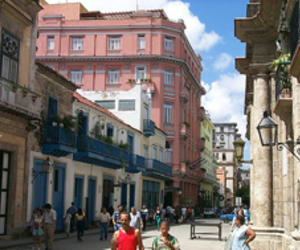Cuban-Americans fret over travel restrictions home
- Submitted by: manso
- Politics and Government
- 07 / 29 / 2011

AP.By LAURA WIDES-MUNOZ - AP Hispanic Affairs Writer. MIAMI (AP) — Sonia Rodriguez whipped up milk-and-espresso drinks at the Latin American Grill as talk turned to a new push in Congress to tighten restrictions on travel to Cuba. Like growing numbers of Cuban-Americans, she's worried about the U.S. reinstating strict limits on how often she can visit relatives and even how much money can be sent to loved ones on the island.
Rodriguez left Cuba 11 years ago. Like many in South Florida, she is worried Congress might succeed in bringing back the Bush-era of travel only once every three years and a $1,200 annual cap on annual remittances. Also under way is an effort to restore stricter limits on the kinds of educational and cultural exchanges now permitted with the government of Raul and Fidel Castro.
Supporters say new restrictions would stop a lucrative travel business and money flow.
"Of course the government gets some of our money, but what are we going to do? Should our families starve?" responded Rodriguez, as she served patrons at the walk-up window of the cafe in the Miami suburb of Doral.
She sends money to her mother. Of her last visit, she added: "I couldn't even spend money on taking my mother out. I just had to buy the basics, milk, toilet paper — those kinds of things."
Soon after taking office, President Barack Obama eased the family travel restrictions to pre-Bush administration levels. He has also issued regulations encouraging travel opportunities for religious, cultural and educational groups. Pure tourist travel is still prohibited under the U.S. trade embargo imposed on Cuba decades ago.
But two Republican Cuban-American congressmen from Miami-area districts are sponsoring measures to roll back the Obama changes, highlighting the division between those who left Cuba long ago and those who arrived more recently and still have ties to the Caribbean nation.
Last week, the Republican-led House Foreign Affairs Committee approved a sweeping bill targeting a Cuba travel and remittances. Republicans and Democrats on the panel backed the move pushed by Rep. David Rivera, R-Fla.
Rivera says the Bush limits were enacted because of abuses to the system, and that a visit once every three years was a reasonable compromise. There is currently no limit on the number of trips Cuban-Americans can make to visit family in Cuba.
Although the full House likely will approve the bill this fall, its prospects are bleak in the Democratic-controlled Senate.
Rep. Mario Diaz-Balart has pushed for a narrower measure targeting only Cuban-Americans. His measure is part of a must-pass financial spending bill, although Senate Democrats could oppose the provision on Cuba. All but certain is opposition from the Obama administration.
Diaz-Balart said too many people were taking advantage of eased travel to Cuba to act as merchandise couriers, propping up the island's faltering economy, and in turn its government.
"This is not a humanitarian issue," he said. "People who go there ten or fifteen times a year. It's become a business, and a very lucrative business for the Castro government."
At the Latin American Grill, customer Juan Manuel Gomez represents the view of many who — like Diaz-Balart's family — left just before or after Cuba's 1959 revolution. Gomez came to the U.S. from Cuba a half century ago when he was 7.
Gomez said many newer Cubans have come more for economic opportunities than for political freedom and don't share his views.
"These days, I'm the exception," he said. "They're status quo."
Rodriguez busied herself with the espresso machine as Gomez spoke. When he left, she said quietly: "I understand how he feels, but I don't support the Cuban government. I just don't want my mother to go hungry."
Gomez may be increasingly in the minority, but those who share his views are more likely to have become U.S. citizens and vote than newer arrivals — even though many of the more recent arrivals live in the two congressmen's districts. The second generation is less likely in general to make Cuba a litmus test.
Still, some general tour companies do appear to be taking advantage of the new rules to provide travel that sounds a lot like tourism.
Adventure travel company Betty Maclean Travel Inc. is offering a luxury tour of Cuba starting in September, touting its connection to a registered not-for-profit group authorized to organize the travel.
That rankles some in powerful quarters. In Washington, the US Cuba Democracy PAC supports a strong embargo of Cuba including limits on travel and boasts a donor list of some of Miami's wealthiest Cuban-Americans.
Travel charters for the Cuban-American community also have gained under the Obama changes. In the past, people were more likely to fly out of third countries. On Wednesday, the agency ABC Charters announced an agreement with Tampa International Airport to provide charter flights to the island for Cuban-Americans.
ABC owner Tessie Aral supports unfettered travel to Cuba. She acknowledged some fellow Cuban-Americans take advantage of the system but says they're the minority.
"Don't' try to take us back to the past. It didn't work then. It won't work now," she said.
She showed The Associated Press petitions signed by more than 1,500 individuals who identified themselves as Cuban-Americans living in Diaz-Balart's district — all collected in the past week. They want the representative to drop his efforts and to meet with them.
Diaz-Balart has refused to receive the petitions as his policy is not to meet with anyone who does business with "totalitarian regimes."
Agencies that charter planes to Cuba must pay a fee to Cuba's national tourism agency.
Source: http://news.yahoo.com/cuban-americans-fret-over-travel-restrictions-home...
Comments